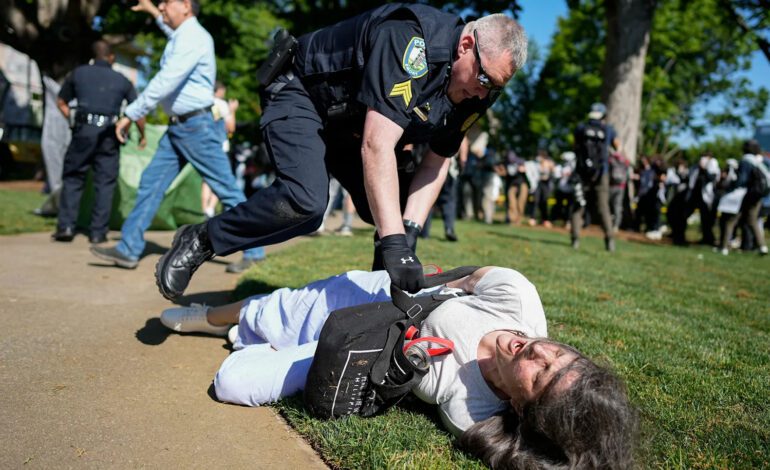By Jamal I. Bittar
In the past few weeks, over 2,600 students have been arrested across the U.S. as universities and colleges, traditionally seen as bastions of free expression, now grapple with clashes between students and overly aggressive law enforcement. The reliance on police enforcement and punitive measures to suppress protests or dialogue with students is unacceptable and does not reflect the principles of an educational institution.
A university or a college serves as a hub where diverse perspectives are not only welcomed but also rigorously examined. However, when we impose restrictions on free expression, we risk constructing echo chambers where only certain ideas flourish, ultimately impeding students’ development of critical thinking skills. Moreover, such limitations can obstruct the quest for knowledge and truth. In an environment where contentious or unpopular notions are suppressed, students may be deprived of the chance to partake in substantive debates and explore alternative viewpoints, thus constraining their intellectual growth and undermining academic freedom.
Additionally, constraining free speech may impede the cultivation of crucial abilities like effective communication, tolerance and resilience. The college years are pivotal for students to learn how to articulate their viewpoints, engage in civil discourse and glean insights from diverse perspectives. By curtailing free speech, we risk shielding students from discomforting ideas and inhibiting their capacity for respectful dialogue.
Furthermore, curbing free speech could have unintended repercussions for marginalized communities. While the intent may be to foster a safe and inclusive environment, excessively restrictive policies might inadvertently silence minority voices and impede progress toward social justice. Maintaining a balance between creating a safe, inclusive atmosphere and preserving free speech is essential to uphold the integrity and objectives of higher education.
The current threat of disciplinary measures for involvement in “unlawful” activities leading to arrest hasn’t been consistently applied to students with previous legal entanglements. Take, for instance, Larry Giberson ’23, who faced indictment by a grand jury for his role in the January 6 riots at the U.S. Capitol and still managed to graduate from Princeton without facing disciplinary action. Despite subsequent convictions, this contrasts starkly with the disciplinary actions and arrests unfolding on campuses now, deviating from established precedents. If college students are forced to echo the sentiments of those in power and face arrest for deviating from such expectations, then we are living in an authoritarian society. It’s hard to imagine anyone considering the deployment of law enforcement in riot gear as a positive outcome. Even those who might see it as necessary are unlikely to view it as good. Therefore, preventing such situations in the future must be a shared objective for all.
Universities need to reassess their priorities and ensure their actions are consistent with their historical commitment to free speech and education. This includes opening channels for constructive dialogue with protesters, similar to the successful de-escalation at Brown University in Rhode Island, Northwestern University in Illinois, Rutgers University at New Brunswick in New Jersey and the University of Minnesota in Minneapolis, while the University of California, Los Angeles has announced plans to revise its security measures following the violent incidents at last weekend’s campus protests regarding the war in Gaza.
The agreements grant partial amnesty to students involved in campus encampments. Brown and Rutgers have pledged not to retaliate against protesters. Both universities confirmed that they will continue to investigate any allegations of bias, harassment or discrimination. The University of Minnesota directed its police not to arrest or charge participants based on actions from the recent protests. Northwestern consented to allow one tent to remain for the use of student protesters, conditional on adherence to the agreement. Both Northwestern and Rutgers have included provisions for scholarships or financial aid for Palestinian students in their agreements.
These universities also committed to enhancing facilities for Muslim students. Rutgers plans to strengthen its existing partnership with a West Bank university, while the University of Minnesota expressed willingness to consider establishing a connection with a Palestinian university. Brown university’s promise to create a space beyond protests—where students can be heard, particularly at the board meeting scheduled for the fall—was crucial. This approach helped students feel that their university was not taking sides, but rather showing a willingness to listen and engage.
Regardless of one’s opinion about the protesters, it is the duty of leadership to de-escalate tensions. These universities demonstrated this by choosing to listen rather than labeling the protesters as merely disruptive youth with idle time or attributing it to external influences, which significantly underestimates the real issues unfolding across the nation. Furthermore, universities will find it advantageous in the long term to build a consensus within their campus community regarding their core values and the ways these should influence their investment strategies. Establishing a compromise is essential in fostering trust between administration and student groups.
As a faculty member deeply committed to free speech — which I view as the cornerstone of democracy and a fundamental element of public education — I feel compelled to call on universities nationwide to change their approach. Stop arresting students for engaging in activism during contentious discussions. Refrain from expelling students who participate in peaceful protests. This is essential if universities are to restore their reputations as protectors of student rights, advocates for student safety, and champions of open discourse.
— Jamal I. Bittar is a professor at the University of Toledo.






Leave a Reply